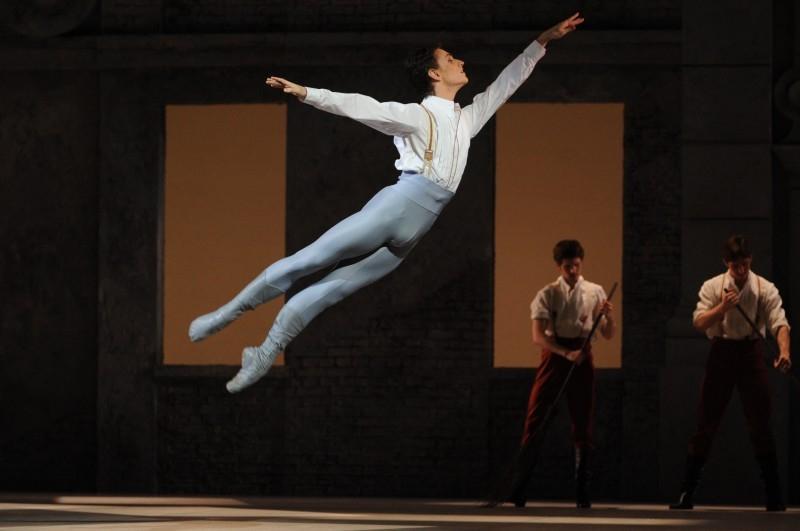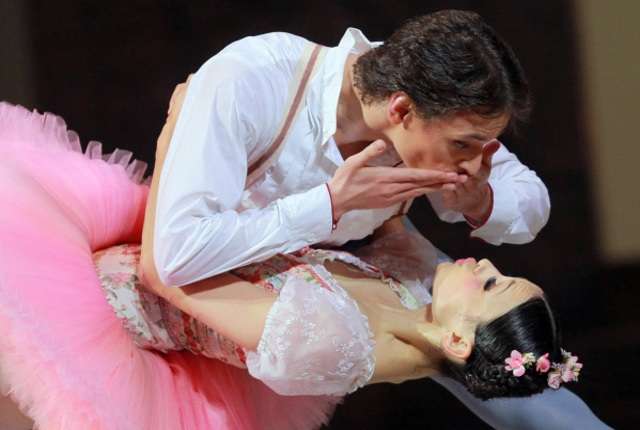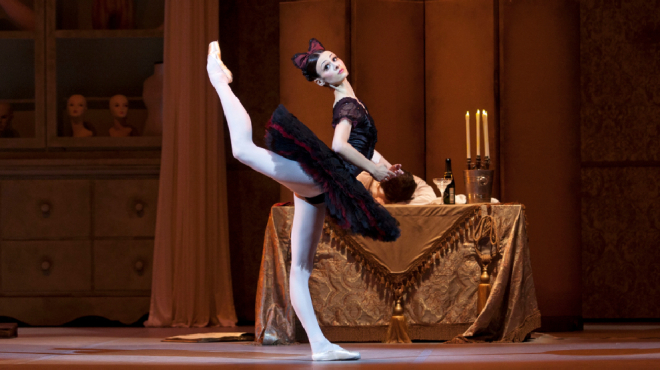Coppélia, Stanislavsky Ballet, London Coliseum | reviews, news & interviews
Coppélia, Stanislavsky Ballet, London Coliseum
Coppélia, Stanislavsky Ballet, London Coliseum
From Russia with kisses - Sergei Polunin bounces back

When a person is happy in his work, he does his best. So best ignore what Sergei Polunin says on the page of a newspaper and look at what he does on stage. Now there’s a happy boy.
A fairground organ wheezes out Swanilda’s lilting waltz, and the curtains part on a pleasing pale grey marble courtyard. It is a weird story, under its pink prettiness - seriously, why is Franz two-timing his girlfriend with a doll? Who is the dollmaker? Why does he make love to his doll? Once he’s mined Franz of his soul to give to the doll, will Franz ever wake up? And what does it matter so long as Sergei Polunin is happily dancing?
 His leaps are as blithe as a shaft of sunshine, and come from nowhere, weightless. His turns are not quite as good, and his partnering is clumsy. But Polunin like this (as opposed to the disengaged creature he was at Alina Cojocaru's gala) is a relaxed, mesmerising stage creature, an entirely natural actor in his metier, who makes you love him despite everything. And that haunting, aquiline face with its old shadows on a young face, continues to be troubling. You do wonder what kind of hellcat Coppélia Dr Coppelius would have made with Polunin’s moody essences, rather than simpleton Franz's.
His leaps are as blithe as a shaft of sunshine, and come from nowhere, weightless. His turns are not quite as good, and his partnering is clumsy. But Polunin like this (as opposed to the disengaged creature he was at Alina Cojocaru's gala) is a relaxed, mesmerising stage creature, an entirely natural actor in his metier, who makes you love him despite everything. And that haunting, aquiline face with its old shadows on a young face, continues to be troubling. You do wonder what kind of hellcat Coppélia Dr Coppelius would have made with Polunin’s moody essences, rather than simpleton Franz's.
There’s a super photo in the programme book of young Roland Petit smirking diabolically, like a man who has at least two subplots going on in his head. One of the greatest character dancers ever, he was Dr Coppelius when he created the ballet in 1975, and no doubt in his performance he could transform the weirdness into a secret allegory about the choreographer and the girl character he’s inventing. No doubt it was plangent, funny, touching, with a hint of Dracula. The Stanislavsky’s Dr Coppelius, Anton Domashev, is as greasily debonair as a tango tutor, smoothing his brilliantined black hair as he sets dinner for his doll and whisks her into a close embrace - he avoids the perve connotations, just, by playing it for laughs.
The girls’ bouncy rose-pink tutus were made with wriggling in mind, and Petit has lots of wriggling in mind
Which is the way this production goes. It has no substance, it feels perfunctory. There are moues and pouts and naughty faces everywhere (it’s very French). The girls’ bouncy rose-pink tutus were made with wriggling in mind, and Petit has lots of wriggling in mind. They blow fusillades of kisses at the soldiers, who dive to their knees and hold lips to attention for a quick French smacker.
It may seem hard to believe, but Swanilda, the dumb girl who impersonates a doll, is a wonderful ballerina role, full of comedic byplay, sexy flirting and (in most cases) quick-footed bravura to match the irresistible sparkle of the music. She hasn’t the knowing virtuosity of Kitri in Don Quixote - Swanilda is probably about 16, adorable and eternally hopeful that Franz will come home for tea.
 Despite the simplicity of the dancing challenge, there should be plenty of space for a good actress to conquer our hearts with her wit and allure. The Stanislavsky ballerina Kristina Shapran is cute, with black hair, a doll-like face and exceptionally long legs, a very young filly. She’s slightly too tall for Polunin, which adds to her charming impression, but dewy as she is, she still has to acquire the virtuosic flair a great Swanilda needs, and I wasn't sure if the skimpiness of the steps was down to Petit or her not quite making them.
Despite the simplicity of the dancing challenge, there should be plenty of space for a good actress to conquer our hearts with her wit and allure. The Stanislavsky ballerina Kristina Shapran is cute, with black hair, a doll-like face and exceptionally long legs, a very young filly. She’s slightly too tall for Polunin, which adds to her charming impression, but dewy as she is, she still has to acquire the virtuosic flair a great Swanilda needs, and I wasn't sure if the skimpiness of the steps was down to Petit or her not quite making them.
The choreography is classical-style, fast and tittuping, with lots of Petit-isms (Petiteries?) - kissy-kissy and sauciness, Lindyhop stuck-out bums, shoulder shrugs and mock rage. The corps de ballet are soldiers and town-girls, bunnyhopping in boots, bustles and bonnets, in line-dances studded with kisses and ooh-la-la. Petit looks to have derived their steps from marionettes, hands patting hearts, bodies dropping forward or back as if a string had slackened - it dovetails neatly with the revelation of the doll Coppelia’s inner workings, and with the delightful sound of that cranky little organ in the orchestra.
The English National Ballet Orchestra takes the visiting Stanislavsky conductor Anton Grishanin’s brisk tempi neatly if without the last degree of charm, and the company dance up a storm of cheer, if without the last degree of musical interest. It makes for an undemanding time, not the best Coppélia, not the best of Petit. But it is, surprisingly, among the best of Polunin.
- The Moscow Stanislavsky Ballet perform Coppelia at the London Coliseum till Sunday
rating
Explore topics
Share this article
The future of Arts Journalism
You can stop theartsdesk.com closing!
We urgently need financing to survive. Our fundraising drive has thus far raised £49,000 but we need to reach £100,000 or we will be forced to close. Please contribute here: https://gofund.me/c3f6033d
And if you can forward this information to anyone who might assist, we’d be grateful.

Subscribe to theartsdesk.com
Thank you for continuing to read our work on theartsdesk.com. For unlimited access to every article in its entirety, including our archive of more than 15,000 pieces, we're asking for £5 per month or £40 per year. We feel it's a very good deal, and hope you do too.
To take a subscription now simply click here.
And if you're looking for that extra gift for a friend or family member, why not treat them to a theartsdesk.com gift subscription?
more Dance
 'We are bowled over!' Thank you for your messages of love and support
Much-appreciated words of commendation from readers and the cultural community
'We are bowled over!' Thank you for your messages of love and support
Much-appreciated words of commendation from readers and the cultural community
 iD-Reloaded, Cirque Éloize, Marlowe Theatre, Canterbury review - attitude, energy and invention
A riotous blend of urban dance music, hip hop and contemporary circus
iD-Reloaded, Cirque Éloize, Marlowe Theatre, Canterbury review - attitude, energy and invention
A riotous blend of urban dance music, hip hop and contemporary circus
 How to be a Dancer in 72,000 Easy Lessons, Teaċ Daṁsa review - a riveting account of a life in dance
Michael Keegan-Dolan's unique hybrid of physical theatre and comic monologue
How to be a Dancer in 72,000 Easy Lessons, Teaċ Daṁsa review - a riveting account of a life in dance
Michael Keegan-Dolan's unique hybrid of physical theatre and comic monologue
 A Single Man, Linbury Theatre review - an anatomy of melancholy, with breaks in the clouds
Ed Watson and Jonathan Goddard are extraordinary in Jonathan Watkins' dance theatre adaptation of Isherwood's novel
A Single Man, Linbury Theatre review - an anatomy of melancholy, with breaks in the clouds
Ed Watson and Jonathan Goddard are extraordinary in Jonathan Watkins' dance theatre adaptation of Isherwood's novel
 Peaky Blinders: The Redemption of Thomas Shelby, Rambert, Sadler's Wells review - exciting dancing, if you can see it
Six TV series reduced to 100 minutes' dance time doesn't quite compute
Peaky Blinders: The Redemption of Thomas Shelby, Rambert, Sadler's Wells review - exciting dancing, if you can see it
Six TV series reduced to 100 minutes' dance time doesn't quite compute
 Giselle, National Ballet of Japan review - return of a classic, refreshed and impeccably danced
First visit by Miyako Yoshida's company leaves you wanting more
Giselle, National Ballet of Japan review - return of a classic, refreshed and impeccably danced
First visit by Miyako Yoshida's company leaves you wanting more
 Quadrophenia, Sadler's Wells review - missed opportunity to give new stage life to a Who classic
The brilliant cast need a tighter score and a stronger narrative
Quadrophenia, Sadler's Wells review - missed opportunity to give new stage life to a Who classic
The brilliant cast need a tighter score and a stronger narrative
 The Midnight Bell, Sadler's Wells review - a first reprise for one of Matthew Bourne's most compelling shows to date
The after-hours lives of the sad and lonely are drawn with compassion, originality and skill
The Midnight Bell, Sadler's Wells review - a first reprise for one of Matthew Bourne's most compelling shows to date
The after-hours lives of the sad and lonely are drawn with compassion, originality and skill
 Ballet to Broadway: Wheeldon Works, Royal Ballet review - the impressive range and reach of Christopher Wheeldon's craft
The title says it: as dancemaker, as creative magnet, the man clearly works his socks off
Ballet to Broadway: Wheeldon Works, Royal Ballet review - the impressive range and reach of Christopher Wheeldon's craft
The title says it: as dancemaker, as creative magnet, the man clearly works his socks off
 The Forsythe Programme, English National Ballet review - brains, beauty and bravura
Once again the veteran choreographer and maverick William Forsythe raises ENB's game
The Forsythe Programme, English National Ballet review - brains, beauty and bravura
Once again the veteran choreographer and maverick William Forsythe raises ENB's game
 Sad Book, Hackney Empire review - What we feel, what we show, and the many ways we deal with sadness
A book about navigating grief feeds into unusual and compelling dance theatre
Sad Book, Hackney Empire review - What we feel, what we show, and the many ways we deal with sadness
A book about navigating grief feeds into unusual and compelling dance theatre
 Balanchine: Three Signature Works, Royal Ballet review - exuberant, joyful, exhilarating
A triumphant triple bill
Balanchine: Three Signature Works, Royal Ballet review - exuberant, joyful, exhilarating
A triumphant triple bill

Add comment